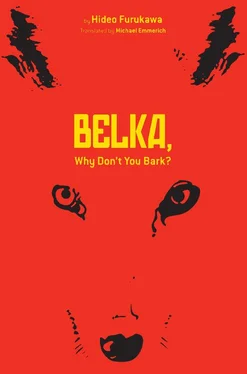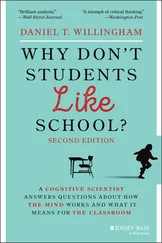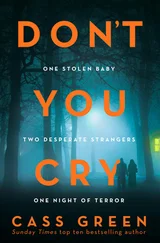Hideo Furukawa - Belka, Why Don't You Bark?
Здесь есть возможность читать онлайн «Hideo Furukawa - Belka, Why Don't You Bark?» весь текст электронной книги совершенно бесплатно (целиком полную версию без сокращений). В некоторых случаях можно слушать аудио, скачать через торрент в формате fb2 и присутствует краткое содержание. Город: San Francisco, Год выпуска: 2012, ISBN: 2012, Издательство: Haikasoru, Жанр: prose_magic, Современная проза, на английском языке. Описание произведения, (предисловие) а так же отзывы посетителей доступны на портале библиотеки ЛибКат.
- Название:Belka, Why Don't You Bark?
- Автор:
- Издательство:Haikasoru
- Жанр:
- Год:2012
- Город:San Francisco
- ISBN:978-1-4215-5089-3
- Рейтинг книги:4 / 5. Голосов: 1
-
Избранное:Добавить в избранное
- Отзывы:
-
Ваша оценка:
- 80
- 1
- 2
- 3
- 4
- 5
Belka, Why Don't You Bark?: краткое содержание, описание и аннотация
Предлагаем к чтению аннотацию, описание, краткое содержание или предисловие (зависит от того, что написал сам автор книги «Belka, Why Don't You Bark?»). Если вы не нашли необходимую информацию о книге — напишите в комментариях, мы постараемся отыскать её.
https://www.youtube.com/watch?v=ay_DcZ6RDFA https://www.youtube.com/watch?v=Orvqrqjk9pU
Belka, Why Don't You Bark? — читать онлайн бесплатно полную книгу (весь текст) целиком
Ниже представлен текст книги, разбитый по страницам. Система сохранения места последней прочитанной страницы, позволяет с удобством читать онлайн бесплатно книгу «Belka, Why Don't You Bark?», без необходимости каждый раз заново искать на чём Вы остановились. Поставьте закладку, и сможете в любой момент перейти на страницу, на которой закончили чтение.
Интервал:
Закладка:
The withdrawal began officially in May 1988 and was completed in February 1989.
On February 25. But did the Afghan War really end on that day? No, it did not. Because the Afghan government was still communist, and it was still friendly with the USSR, and it was still at odds with the mujahideen. And to make matters worse, the mujahideen organizations were at odds with each other as well, divided by all sorts of factors: were they composed largely of Pashtuns or non-Pashtuns, were they Sunni or Shi’a, and so on. Obviously the country was bound to descend into civil war. The USSR decided, first of all, that it would be unprofitable to allow Kabul’s pro-Soviet communist government to collapse; second, that since the Soviet Union shared a twelve-hundred-mile border with Afghanistan, any exacerbation of the situation within Afghanistan would pose a threat to the safety of the border regions; and third, that if the current government were to fall and be replaced by an Islamic government, the ensuing confusion was bound to spread to the Central Asian members of the USSR, including Tajikistan, Uzbekistan, and the other Islamic autonomous republics.
So the USSR continued to supply the communist, pro-Soviet Afghan government with vast quantities of aid, both financial and in the form of weapons.
And then something else happened.
This was just before the last of the one hundred thousand occupying soldiers withdrew.
On January 24, 1989, a meeting of the Politburo of the Central Committee of the Communist Party of the Soviet Union ratified a top-secret report that gave permission to the KGB Border Guards, then stationed in the north of Afghanistan, to carry out a certain strategic mission.
Needless to say, this was in violation of the peace accord.
The USSR’s quagmire, the Afghan War, wasn’t over yet. The Soviet Union itself refused to let it end. It kept going until the end of the year. But only in secret. The KGB took control, and only units that knew how to keep their activities secret were involved. Once again “S” was called in. Its fighters were special operations professionals, and they would keep quiet about their achievements in battle. Its fighters were the most powerful unconventional troops in the entire Border Guard. As for Gorbachev… Gorbachev was content to let this happen, as long as the Afghan “problem” was settled, as long as it didn’t cause any disruption domestically. He wasn’t concerned that the plan “stank of Khrushchev,” as Chernenko and Brezhnev had been. Indeed, as far as he was concerned “S” was just another useful organization—he wasn’t even aware that it had originated in Khrushchev’s time. And so once again “S” was granted authority to carry out illegal assignments in secret. It eliminated targets marked for elimination. In public, Gorbachev continued shouting his slogan as before: Perestroika! Perestroika! And in December 1989, he finally pushed his “new thinking” diplomacy to the limit. A Soviet-American summit was held off the shore of Malta, on a Soviet missile cruiser named Slava . Gorbachev welcomed American President George H. W. Bush with a smile. He announced that the Soviet Union and the United States were now friends. The Cold War was over. Lasting peace had been achieved between the two states. A press conference attended by reporters from all around the world was held on December 3. All across the globe, people stared at their television screens. This was a day that would go down in the history of the twentieth century. In human history. And as for dog history… dog history…
On that same day, December 3, a secret order was issued.
“Destroy all the evidence,” read the order, which had come by way of Moscow. “Leave no trace of the top-secret operations in Afghanistan. There is no Cold War. Kill the dogs.”

“This is not 1991.”
And then the street fighting began.
This was not a rehearsal. This was no simulation in the life-sized model of an abandoned city. Eighty-two people died the first day. Among them were seven bosses in the two largest criminal organizations. Three from the Russian mafia, four from the Chechen mafia. No one was paying attention anymore to whether the bloodshed was balanced. Then there were casualties among the various criminal organizations that had started streaming into the city from all across Russia, all over Asia. Many, many casualties.
The dogs began by paying house calls. There were groups on the move with lists of the members of the mafia organizations, photographs affixed. Three or four of them. One of the groups comprised an old Slavic woman with thick glasses who was built like a barrel, a Japanese girl still in her early teens, and seven dogs. Their list had the names and addresses of the mafia headquarters, affiliated facilities, and businesses, and the names and home addresses of their leaders, along with other details. The old lady led the dogs on a leash. The girl wore a shapka , pulled down low over her forehead against the cold; her face, as she walked, wore no expression at all. She looked, somehow, like the old lady’s granddaughter. She was obese. Obese in a combative sort of way. A cold glitter shone in her eyes. She was Japanese, but not in the usual way. She was Japanese like a Hokkaido dog is Japanese. Yes, indeed: she wasn’t a person, she was a dog.
Why? Because she had a dog name.
Given to her as a sign of her legitimacy: Strelka.
House calls. They’d finish one, then go on to the next. The old lady managed the gun, the dog-girl handled the dogs. Their first target lived in a luxury apartment complex. They could make him open the door himself, or they could blast it open with the gun. The girl-dog gave the commands, sometimes in Russian, sometimes in a dog language made up solely of gestures. The dogs dashed in. Keeping low, keeping out of sight. Seven dogs entered, one in charge. He was a male. The dog that was once known as number 47, the dog the girl-dog used to call Forty-seven. He went by a different name now.
Now he was Belka. His dad had died, so he had graduated from a number to a name.
Belka sprang, killed. Fell into formation with the other six dogs, leapt instantly at the target, and it was over. Just like that.
At the same time, in another place, on the grounds of a grand estate, a guard dog was killed. Teeth ripped silently into his throat. First the dogs killed their brethren, then they killed the target’s guards, then they killed the target. In some locations the target knew immediately that he was under attack and tried to escape in his car. But the surrounding roads had been closed. By dogs. They ringed the expensive car with its bulletproof windows, leapt at it, caused the target to panic, to err—to die.
They led him to kill himself.
It was a canine rebellion. On the first day, no one noticed how many mafiosos had been killed. Aside from the mafia themselves, that is, and the authorities and the company executives the mafia had bought.
Then, late at night, the city caught fire. That people noticed… And there was rioting. That same night, an old man surrounded by dogs read coordinates from a military map. To the dogs. And then into a radio handset.
1991. Moscow in the summer. In the early hours of the day, before dawn, the government declared a state of emergency. Now it was the afternoon. Already more than five hundred tanks were positioned at various points around the city. The man who had been elected the first president of the Soviet Union in March of the previous year had suddenly been removed from power. A conservative coup d’état was underway. The ringleaders included the defense minister, the head of the KGB, and the vice president. The troops in the tanks were prepared to conduct a mass arrest of everyone in the reformers’ camp. Television was censored, and the radio played the “Declaration of the Soviet Leadership” again and again. Nevertheless, the people were out in the streets. Gathered before the Russian Parliament, the reformist faction’s base. They linked arms to form a human chain, tried to keep the tanks and armored cars from entering. They built barricades—barricades behind barricades, barricades behind barricades behind barricades. Already several thousand demonstrators had converged in the square.
Читать дальшеИнтервал:
Закладка:
Похожие книги на «Belka, Why Don't You Bark?»
Представляем Вашему вниманию похожие книги на «Belka, Why Don't You Bark?» списком для выбора. Мы отобрали схожую по названию и смыслу литературу в надежде предоставить читателям больше вариантов отыскать новые, интересные, ещё непрочитанные произведения.
Обсуждение, отзывы о книге «Belka, Why Don't You Bark?» и просто собственные мнения читателей. Оставьте ваши комментарии, напишите, что Вы думаете о произведении, его смысле или главных героях. Укажите что конкретно понравилось, а что нет, и почему Вы так считаете.












